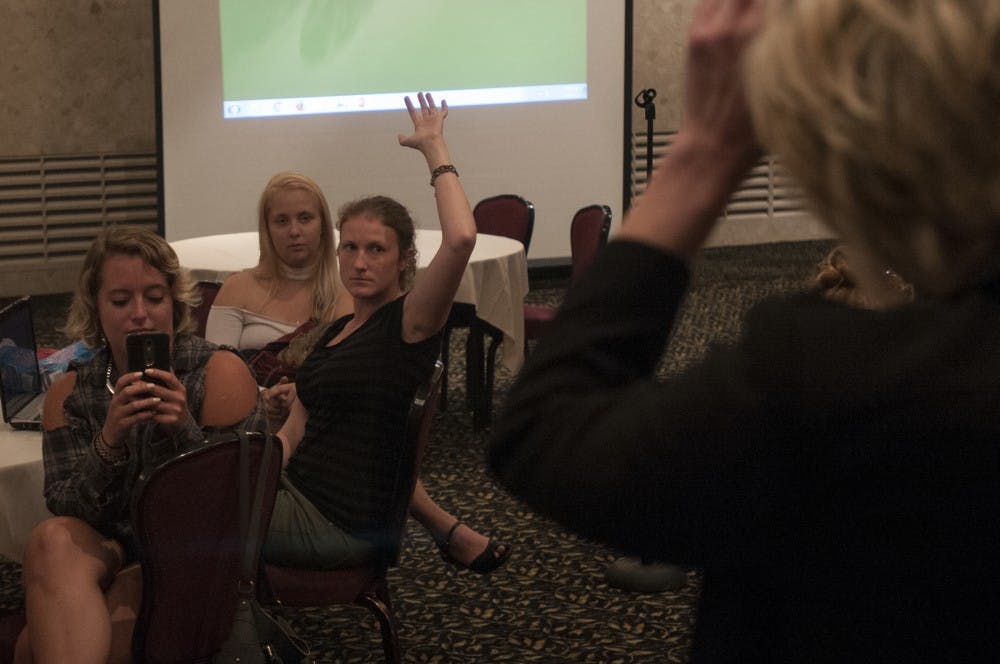Amongst heated discussion at Tuesday’s public forum at the Union about the closing of the former Women’s Lounge, students blasted the MSU administration for the mishandling of sexual assault cases.
“I should not feel scared walking home at 9 p.m. on a weeknight,” sociology senior Katrina Groeller said. “But I do, and this is one of many reasons why. What does the closure of this space mean for the rest of safe spaces at MSU?”
Student after student expressed frustration that MSU showed a continued sense of apathy toward female students, shutting down both the Women’s Lounge, Women’s Resource Center and women’s clinic this summer. Students heavily questioned the university’s attitude toward female students’ safety.
“I would love to tell others to utilize the other services that MSU has, like the Olin Health Center,” political theory and constitutional democracy senior Lindsey Diamond said. “But unfortunately MSU has not hired enough therapists for me to even do that. Most students who seek help from Olin are put on a long waiting list based on severity, or referred out — I want to see MSU hiring more therapists.”
Students lamented over the Sexual Assault and Relationship Violence, or SARV, program, a first-year and transfer student initiative that is supposed to be mandatory — but as many of the students said, can be skipped without repercussions. Students argued that even those who do attend do not retain the information for long.
“As an RA (resident assistant), I want to see more done to enforce SARV,” social relations and policy sophomore Allie Etzin said. “I want to be able to tell my residents it is as ‘mandatory’ as the university says it is.”
One student, amidst a rain of applause, brought up that 1 in 4 undergraduate women at MSU have been sexually assaulted, which is higher than the national average on college campuses, 1 in 5, according to according to a survey conducted by MSU and the Association of American Universities.
“Many students share my sentiments that a one-time workshop maybe isn’t the most effective way of informing students about sexual assault on campus,” sixth-year doctoral student Apryl Pooley said. “Why can’t we have multiple workshops?”
There were male students who showed their support in the discussion as well, calling out the hypocrisy of MSU’s handling of Title IX.
“It seems like a bit of a lack of prioritization here,” social relations and policy junior Sam Granger said. “Because that violation of Title IX has no ramifications for students who were victims of sexual assault under Title IX, whereas this violation with the Women’s Lounge has been called into question based off of a few negative comments. I hear too many stories of women who still go to the same school as their rapists.”
The administration in the room, who offered little comment during the mostly student-led discussion, stayed quiet under the mounting conversations heldd by students.
“Basically, one person made a complaint to the state federal agency that the Women’s Lounge was against Title IX instead of coming directly to MSU,” MSU’s Title IX coordinator Jessica Norris said. “MSU would be fighting a long and expensive legal battle with the state to keep it open.”
Professor and chair of the Sexual Violence Committee Amy Bonomi, the moderator of the discussion, said she was glad to see students get involved in the discussion to make MSU’s campus better.
“I hope that this forum is a small part of a continued culture of campus climate change,” Bonomi said. “The voices we heard tonight are incredibly helpful to change.”
The quote, “Many students share my sentiments that a one-time workshop maybe isn’t the most effective way of informing students about sexual assault on campus. ... Why can’t we have multiple workshops?” that was previously attributed to Katrina Groeller should have been attributed to Apryl Pooley. It has been fixed in the online version of the story.






